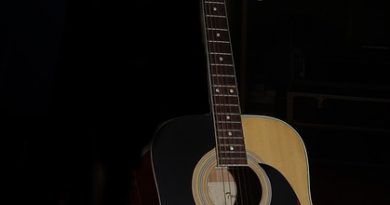The Ultimate Beginner’s Guide to Finding the Perfect Guitar Teacher
The Ultimate Beginner’s Guide to Finding the Perfect Guitar Teacher
Learning to play the guitar can be an incredibly rewarding experience, but finding the right teacher to guide you along the way is crucial to your success. With so many options available, it can be overwhelming to know where to start. In this guide, we will break down the process of finding the perfect guitar teacher for you as a beginner.
1. Determine Your Goals
Before you start your search for a guitar teacher, it’s important to determine your goals as a musician. Are you looking to play for fun, or do you have dreams of performing on stage? Do you want to focus on a specific genre of music, or are you interested in learning a variety of styles? Understanding your goals will help you narrow down your search and find a teacher who can help you achieve them.
2. Research Local Teachers
Start your search by looking for guitar teachers in your local area. You can ask for recommendations from friends, family, or music stores, or search online for teachers in your area. Make a list of potential teachers and take the time to research their backgrounds, experience, and teaching styles. Look for teachers who have experience working with beginners and who have a track record of helping their students succeed.
3. Schedule a Trial Lesson
Once you have a list of potential teachers, reach out to them to schedule a trial lesson. A trial lesson is a great way to get a sense of the teacher’s teaching style, personality, and approach to music. During the lesson, pay attention to how the teacher communicates with you, how they assess your skill level, and how they structure the lesson. This will help you determine if the teacher is a good fit for you and if you feel comfortable working with them.
4. Ask Questions
Don’t be afraid to ask questions during your trial lesson or when researching potential teachers. Some questions you may want to consider asking include:
– What is your teaching philosophy?
– How do you structure your lessons?
– Can you accommodate my schedule?
– Do you have experience working with beginners?
– What is your background in music and teaching?
Asking these questions will help you get a better sense of the teacher’s qualifications, experience, and approach to teaching.
5. Consider Online Lessons
In addition to traditional in-person lessons, many guitar teachers also offer online lessons. Online lessons can be a convenient option for beginners who may not have access to a local teacher or who prefer to learn from the comfort of their own home. When considering online lessons, make sure you have a reliable internet connection and a quiet space to practice. You should also ask the teacher about their experience with online teaching and how they structure their online lessons.
6. Set Realistic Expectations
Learning to play the guitar takes time, patience, and dedication. As a beginner, it’s important to set realistic expectations for your progress and to be patient with yourself as you learn. A good guitar teacher will understand your goals and abilities and will work with you to help you achieve them at a pace that is comfortable for you.
7. Practice Consistently
No matter how talented your guitar teacher is, your progress as a musician ultimately comes down to how much time and effort you put into practicing. Make sure to set aside time each day to practice and review the material covered in your lessons. Consistent practice is key to improving your skills and progressing as a guitarist.
8. Trust Your Instincts
When it comes to finding the perfect guitar teacher, trust your instincts. If you feel a connection with a teacher and feel comfortable working with them, that is a good sign that they may be the right fit for you. Remember that learning to play the guitar is a personal journey, and finding a teacher who understands your goals and supports your progress is essential to your success.
In conclusion, finding the perfect guitar teacher as a beginner is a process that requires research, trial lessons, and asking questions. By determining your goals, researching local teachers, scheduling trial lessons, asking questions, considering online lessons, setting realistic expectations, practicing consistently, and trusting your instincts, you can find a teacher who will help you achieve your musical goals and guide you on your journey to becoming a skilled guitarist.






